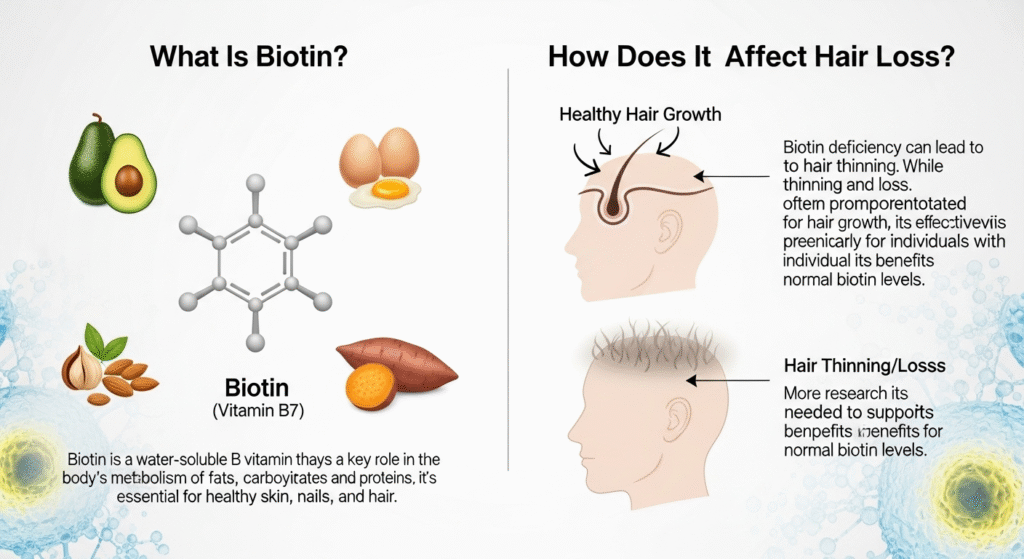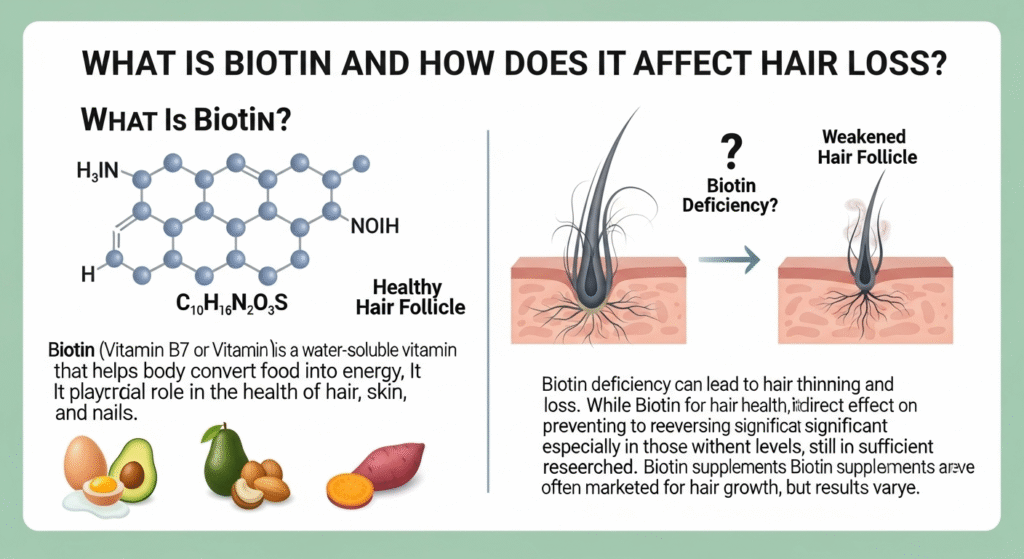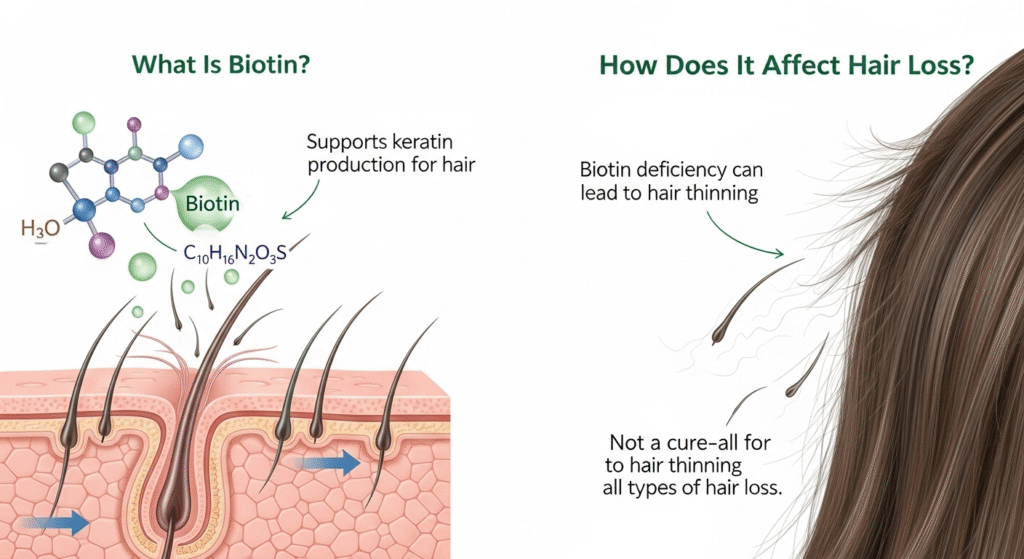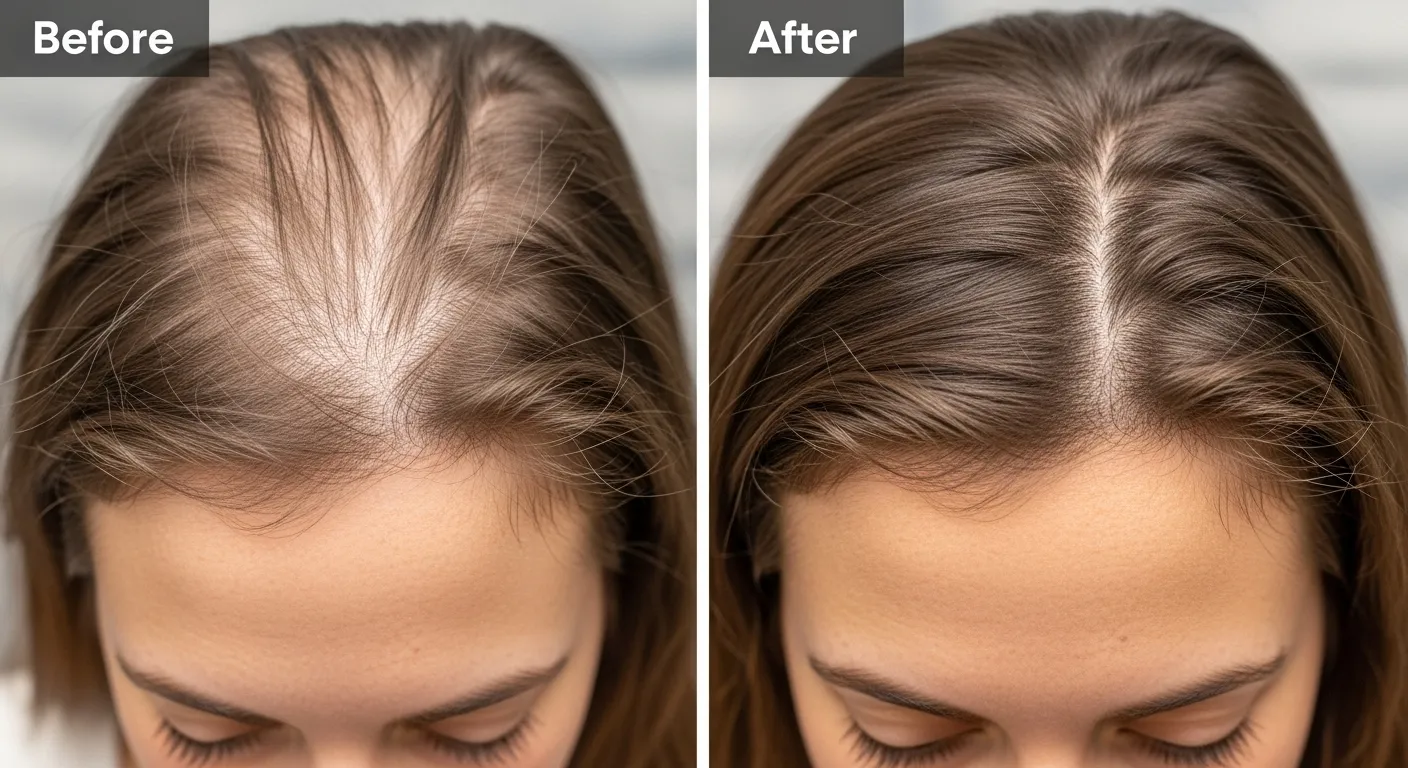If you’re experiencing hair loss, you’ve likely considered using biotin supplements to help promote hair growth. Biotin, also known as vitamin B7, is a crucial nutrient that supports hair health. In this guide, we will clarify the ideal biotin dose for hair loss, its benefits, and how to use it effectively. By understanding how biotin …
If you’re experiencing hair loss, you’ve likely considered using biotin supplements to help promote hair growth. Biotin, also known as vitamin B7, is a crucial nutrient that supports hair health.
In this guide, we will clarify the ideal biotin dose for hair loss, its benefits, and how to use it effectively. By understanding how biotin works and what dose is optimal, you’ll be empowered to take control of your hair health and make informed decisions. Whether you’re just starting with biotin or looking for a better routine, this article will provide expert-backed advice for healthier hair.

What Is Biotin and How Does It Affect Hair Loss?
Understanding Biotin’s Role in Hair Health
Biotin is a water-soluble B vitamin that plays an essential role in various bodily functions, including the growth of hair, skin, and nails. It is involved in the synthesis of keratin, a protein that is crucial for healthy hair growth. When biotin levels are low, hair may become brittle, leading to shedding or thinning.
Biotin Deficiency and Its Impact on Hair Growth
A deficiency in biotin can lead to hair thinning, hair loss, and brittle nails. Biotin is commonly found in foods like eggs, nuts, and seeds, but it can be challenging to consume enough through diet alone, especially if you have certain medical conditions that affect nutrient absorption. In these cases, a supplement may help restore biotin levels and promote hair health.
The Science Behind Biotin’s Effectiveness for Hair Loss
Several studies suggest that biotin can improve the thickness and strength of hair. While research on biotin’s direct effect on hair loss remains limited, anecdotal evidence supports its role in improving hair growth, particularly for those with biotin deficiency.
What Is the Right Biotin Dose for Hair Loss?

Recommended Biotin Dosage for Hair Growth
The appropriate biotin dose for hair loss depends on individual factors such as age, overall health, and the severity of hair loss. Generally, biotin supplements come in doses ranging from 1,000 mcg to 10,000 mcg. While the recommended daily intake of biotin for the average adult is 30 mcg, hair growth supplements typically contain much higher doses.
How Much Biotin Should You Take Daily for Hair Loss?
If you are experiencing hair loss, you may benefit from taking biotin in higher doses, such as 5,000 mcg or 10,000 mcg per day. However, it’s essential to start with a lower dose to assess how your body reacts. Consulting a healthcare provider before starting any new supplement is crucial, especially if you have underlying health conditions or are on medication.
How Long Should You Take Biotin for Hair Growth?
It’s important to note that biotin supplementation may take time to show noticeable results. While some individuals see improvements in as little as 4–6 weeks, others may require 3–6 months of consistent use to observe significant changes in hair growth and thickness. Patience is key when incorporating biotin into your hair care routine.
Can Biotin Really Help with Hair Loss?
Biotin’s Benefits Beyond Hair Health
While biotin is widely known for its positive effects on hair growth, it also benefits other areas of your health. Biotin supports skin health by aiding in the metabolism of fats, proteins, and carbohydrates. It also strengthens nails, preventing them from becoming brittle.
Common Myths About Biotin and Hair Loss
There are many myths surrounding biotin, especially regarding its ability to solve all hair-related issues. While biotin can help those with a deficiency, it’s not a cure-all for hair loss caused by other factors, such as genetics, stress, or hormonal imbalances.
What Are the Side Effects of Taking Biotin?
Common Side Effects of High Biotin Dosages
Most people tolerate biotin well, but taking excessive doses may lead to side effects, including acne, digestive discomfort, and in rare cases, allergic reactions. It’s important to follow recommended dosages and consult a healthcare provider if you experience any adverse effects.
How to Avoid Biotin Overdose and Side Effects
To avoid overdosing on biotin, it’s advisable to start with a lower dose, such as 1,000 mcg per day, and gradually increase as needed. If you experience any side effects, reducing the dose or discontinuing use may help alleviate symptoms.
How to Incorporate Biotin Into Your Hair Care Routine?

Top Biotin Supplements for Hair Growth
When choosing a biotin supplement, look for high-quality products that are free of additives or fillers. Some popular biotin supplements for hair growth include Nature’s Bounty, Sports Research, and Solgar. Always read the label to ensure you’re getting the correct dosage.
Biotin-Rich Foods to Support Hair Health
In addition to supplements, consuming biotin-rich foods can support your hair health. Eggs, almonds, spinach, and sweet potatoes are excellent sources of biotin. Incorporating these foods into your diet can complement the effects of biotin supplements.
Combining Biotin with Other Hair Growth Treatments
For optimal results, biotin can be used in conjunction with other hair growth treatments, such as topical minoxidil or laser therapy. However, always consult a healthcare professional before combining supplements and treatments.
Case Studies and Expert Opinions on Biotin for Hair Loss
Real-life Experiences with Biotin for Hair Growth
Many individuals have experienced positive results from taking biotin supplements for hair loss. For example, a 35-year-old woman who suffered from thinning hair, noticed a significant improvement in hair density and strength after taking 10,000 mcg of biotin daily for three months.
Expert Recommendations on Biotin Use for Hair Loss
Experts recommend that individuals with hair loss due to biotin deficiency try supplementation for a period of at least 3–6 months before determining whether it’s effective. As always, consulting a dermatologist or healthcare provider is essential for personalized guidance.
FAQs
How long does it take to see results with biotin for hair loss?
Results can take anywhere from 4–6 weeks to several months, depending on individual factors.
Is biotin safe for long-term use?
Yes, biotin is generally safe for long-term use, but it’s important to stick to recommended doses.
What’s the best biotin supplement for hair growth?
Look for supplements that contain at least 5,000 mcg of biotin, along with other hair-healthy vitamins like zinc and vitamin D
Can I take biotin with other supplements or medications?
Yes, but it’s always best to consult with a healthcare provider to ensure there are no interactions.
What happens if I take too much biotin?
Excessive biotin can cause side effects such as acne, digestive discomfort, or more severe reactions in rare cases.
Conclusion
If you’re looking to improve your hair health, biotin supplementation may be an effective solution, especially if you’re dealing with a deficiency. Remember to start with a lower dose and gradually increase it, and always consult a healthcare professional before starting a new supplement. Consistency is key to seeing results, and with patience, you could see significant improvements in your hair growth.
Ready to take the next step toward healthier hair? Book a consultation with Dr. Uzma Irfan, an ISHRS-certified surgeon in Islamabad today and get personalized advice on how to incorporate biotin into your hair care routine.






